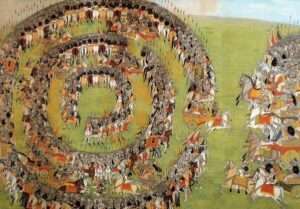
The Thirteenth Day – Abhimanyu
The thirteenth day of the most catastrophic war ever fought corresponded to the third since Bhishma had fallen and Drona had assumed command. The sacred place of Kurukshetra, where in the past so many holy and peaceful ascetics had lived, had become an immense cemetery; the sky above was full of vultures, and during the night wolves and hyenas invaded it to feed on the corpses.
The Trigarta were the first to move: calling Arjuna aloud, they headed for the southern slope and he, reluctantly, had to move quickly in their wake. As he saw him go away, Drona gave instructions for organizing the impenetrable and very complicated padma-vyuha, according to which the armies would be arranged in the form of a gigantic lotus flower.
The Kauravas attacked first.
Deprived of the support of Arjuna, the Pandavas suffered terribly from the attacks of Drona and although they tried hard to break through the complicated enemy formation, all their efforts were worth nothing. Seeing every attack fail and seeing his battalions decimated by the waves of enemy assaults, Yudhisthira was alarmed: if it went on like that, his army would be destroyed by nightfall. He regretted not being able to dispose of his brother, who would have been busy for a long time against the obstinate and angry Susharma and thought about what could be done. There were only four men in the world who could penetrate the twisted brow of the vyuha: Krishna, his son Pradyumna, Arjuna and Abhimanyu, and only the latter was available at that time. But, brave as he was, his nephew was young, and still inexperienced, so Yudhisthira could not decide whether to put his life in jeopardy. Finally, not tolerating further the undoing that Drona was causing, he called for Abhimanyu.
“Do you see our acarya’s padma-vyuha?” he asked. “Other than you, none of us are able to create an opening right now that can allow us to fight on an equal footing. And look what is happening: all our attacks vanish like soap bubbles against their defenses, while they wreak havoc among our troops. If we continue like this, this day will become our last. I know you know the art of penetrating it. Do it, then, and save us from this terrible situation.”
Abhimanyu surveyed the enemy line and thought gravely.
“Yes, I can do it, but there is one thing you need to know. I have been taught since childhood by my father and Krishna on the art of breaking padma-vyuha, and this does not entail any particular difficulties; however, I have not learned how to get out of it. So how will I survive when I find myself alone inside the enemy formation?”
“Don’t worry about that,” replied Yudhisthira, “because you won’t be isolated; the idea is to forcefully penetrate the enemy ranks and create havoc. As soon as you have created a breach, the strongest among us will follow you and help you. Bhima, Nakula, Sahadeva, Dhristadyumna, Drupada and hundreds of other heroes will be by your side every moment.”
Despite the obvious risk involved in the mission, the eyes of the barely sixteen-year-old boy shone with contentment: penetrating the padma-vyuha had always been the most exciting game of his childhood, and he had always dreamed of doing it with a real army.
Spurred on by the charioteer who, unlike his master, felt rather agitated, the chariot quickly darted in the direction of the opposing army, following a route studied thousands of times.
This is a section of the book “Maha-bharata, Vol. 2”.
To buy the complete book, click above
Post view 252 times



Leave a Reply